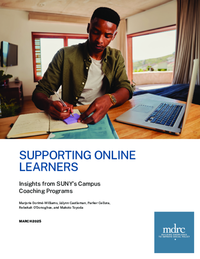Supporting Online Learners
Insights from SUNY’s Campus Coaching Programs

In the fall 2022 semester, over half of college students took at least one online course, and approximately 20 percent of public four-year college students and 32 percent of community college students engaged exclusively in online education. So understanding how to effectively support online learners is critical. While research suggests that some forms of online learning do not have a negative impact on students, online learners are less likely to stay enrolled than their in-person peers. This study examines how three institutions that are part of the State University of New York (SUNY) implemented success coaching programs to support online students’ academic achievement and educational experiences. The study included interviews with coaches, student focus groups, a student survey, and an analysis of institutional data regarding online and in-person students. Each institutional partner has a program that serves a different online student population: one serves students in a fully online accounting degree program; the second, students enrolled in any online degree program, and the third, all students enrolled in online courses, regardless of their degree program.
The study finds that while online students can achieve short-term academic outcomes comparable to those of their in-person peers, their institutional experiences may not include the same levels of support. High coach-to-student ratios and limited interactions with peers and faculty members shape the experiences of online learners. When considering how to support online learners, institutions should identify a specific population, provide access to available services, personalize communication, and promote community and engagement among students, coaches, and faculty members. Institutions should also ensure that coaching staff members have training and sufficient resources, such as access to appropriate technology and data, and that there are enough staff members to meaningfully engage with students. Finally, university systems seeking to develop institutional programs to support online learners should consider ways to ensure that campuses have sufficient resources to engage diverse learners, consistent ways to identify the student population, and the ability to collect and analyze data about online learners.







